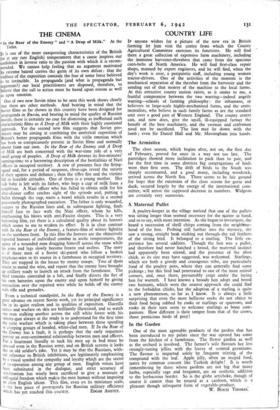THE CINEMA
6 In the Rear of the Enemy " and " A Drop of Milk." At the Tatter.
✓ is one of the more exasperating characteristics of the British or at any rate English) temperament that a cause inspires our onfidence in inverse ratio to the passion with which it is recom- ended. We cannot help feeling that an argument motivated .y extreme hatred carries the germ of its own defeat: that the ioltnce of the exposition conceals the fear of some force believed
o be invincible. In propaganda rand what is propaganda but rgument?) our local practitioners are disposed, therefore, to fieve that the call to action must be based upon reason as well s upon emotion.
One of two new Soviet films to be seen this week shows clearly that there are other methods. And bearing in mind that the Soviet films so far shown in this country have been designed for propaganda in Russia, and bearing in mind the quality of Russian morale, there is certainly no case for dismissing as ineffectual such charicteristic films as A Drop of Milk with their highly emotional approach. Yet the second new film suggests that Soviet pro- ducers may be aiming at combining the analytical exposition of Britain's better propaganda films with the virile emotion which has been so conspicuously present in Soviet films and normally absent from our own. In the Rear of the Enemy and A Drop of Milk are both concerned with the war-time role of a very small group of peoples. A Drop of Milk devotes its five-minutes' running-time to a harrowing description of the bestialities of Nazi officers in occupied territory. A row of peasants face the firing- squad and, for a period of suspense, close-ups reveal the variety of their agonies and defiance ; then the rifles fire and the victims fall in horrible attitudes. One of them is a young mother. Her sick baby is left with its father, who begs a cup of milk from a neighbour. A Nazi officer who has failed to obtain milk for his after-dinner coffee catches sight of the episode and, putting a bullet through the cup, starts .a brawl which results in a second gruesomely photographed execution. The father is only wounded, escapes to the Russian lines and, in subsequent fighting, finds himself face to face with the Nazi officer, whom he kills, emphasising his blows with anti-Fascist slogans. This is a very harrowing film, yet there is a calculated quality about its horrors which seems to me to weaken its effect. It is in clear contrast with In the Rear of the Enemy, a feature-film of winter fighting on the northern front. In this film the horrors are the objectively reported horrors of individual combat in arctic temperatures, the agony of a wounded man dragging himself across the snow while his arms and legs slowly become frozen and useless. The story is of three men of a Soviet ski-patrol who follow a broken telephone-wire to its source in a farmhouse in occupied territory. They are trapped in the house by enemy troops. Two of them return to mend the wire, and report that the enemy have brought up artillery ready to launch an attack from the farmhouse. The third remains concealed in a loft, and finally directs the fire of his own batteries upon the enemy and upon hiniself by giving instruction over the repaired wire while he holds off the enemy with rifle and grenades.
From a technical standpoint, In the Rear of the Enemy is a great advance on recent Soviet work, yet its principal significance lies in its quiet realism and its qualities of exposition. Guerilla tactics and warfare on skis are brilliantly illustrated, and to watch one man stalking another across the still white forest with his tommy-gun always at the ready is to understand for the first time the eerie warfare which is taking place between these speeding or creeping groups of hooded, white-clad men. If In the Rear of the Enemy has a fault, it is perhaps that the early sequences Portray an over-sentimental relationship between men and officers. For a lieutenant literally to tuck his men up in bed must be unusual even in the Russian army, and on British screens it looks like an old soldier's joke. Yet it may be that the Russians, with- out reference to British inhibitions, are legitimately emphasising by a visual symbol the sympathy and loyalty which are the secret of co-operation among any group of men. English voices have been substituted in the dialogue, and strict accuracy of synchronism has wisely been sacrificed to give a measure of colloquial freedom which makes the men human without imposing all. alien English idiom. This film, even on its miniature scale, :5 the best piece of propaganda for Russian military efficiency which has yet reached this country. EDGAR ANSTEY.


























 Previous page
Previous page